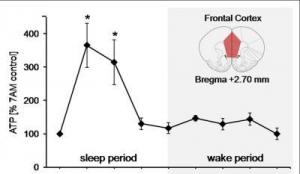Brain's Energy Restored During Sleep
In the initial stages of sleep, energy levels increase dramatically in brain regions found to be active during waking hours, according to new research in the June 30 issue of the Journal of Neuroscience. These results suggest that a surge of cellular energy may replenish brain processes needed to function normally while awake.
 |
| currency of cells, in rats increased in four key brain regions normally active during wakefulness. Shown here is the energy surge measured in the frontal cortex, a brain region associated with higher-level thinking. (Credit: Courtesy, with permission: Dworak et al. The Journal of Neuroscience 2010.) |
A good night's rest has clear restorative benefits, but evidence of the actual biological processes that occur during sleep has been elusive. Radhika Basheer, PhD, and Robert McCarley, MD, of Boston V.A. Healthcare System and Harvard Medical School, proposed that brain energy levels are key to nightly restoration.
"Our finding bears on one of the perennial conundrums in biology: the function of sleep," Basheer said. "Somewhat surprisingly, there have been no modern-era studies of brain energy using the most sensitive measurements."
The authors measured levels of adenosine triphosphate (ATP), the energy currency of cells, in rats. They found that ATP levels in four key brain regions normally active during wakefulness increased when the rats were in non-REM sleep, but were accompanied by an overall decrease in brain activity. When the animals were awake, ATP levels were steady. When the rats were gently nudged to stay awake three or six hours past their normal sleep times, there was no increase in ATP.
The authors conclude that sleep is necessary for this ATP energy surge, as keeping the rats awake prevented the surge. The energy increase may then power restorative processes absent during wakefulness, because brain cells consume large amounts of energy just performing daily waking functions.
"This research provides intriguing evidence that a sleep-dependent energy surge is needed to facilitate the restorative biosynthetic processes," said Robert Greene, MD, PhD, of the University of Texas Southwestern, a sleep expert who was unaffiliated with the study. He observed that questions arise from the findings, such as the specific cause of the ATP surge. "The authors propose that the surge is related to decreases in brain cell activity during sleep, but it may be due to many other factors as well, including cellular signaling in the brain," he said.
The research was supported by the Department of Veterans Affairs, a Deutsche Forschungsgemeinschaft Fellowship, and the National Institute of Mental Health.





















0 comments:
Post a Comment
Please do not spam Spam comments will be deleted immediately upon my review.